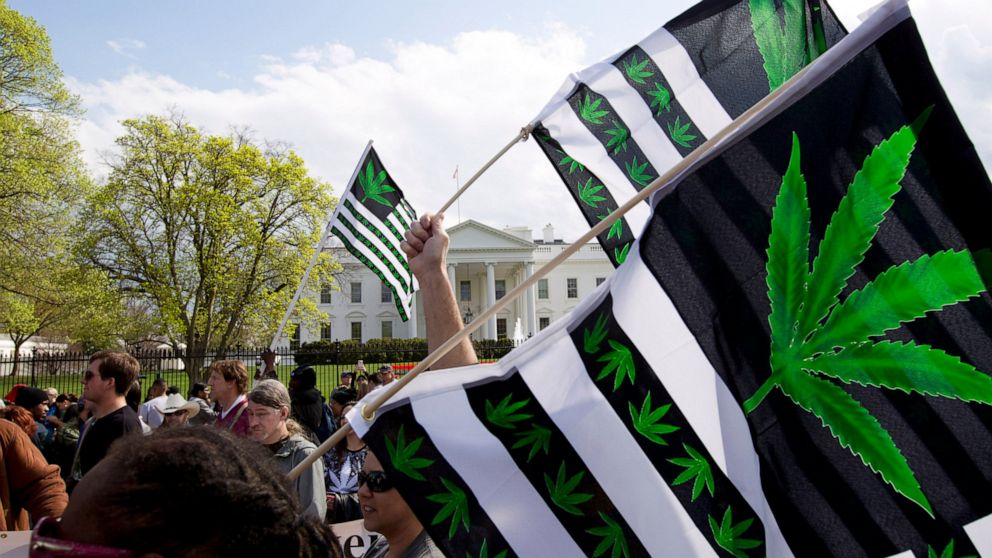President Joe Biden pardoned all US citizens convicted on federal charges for simple possession of marijuana on October 6 this year. This action will provide over 6,500 Americans with easier access to housing, employment, college, and even voting, all of which are restricted for felons in certain states. As such, this pardon is a major step toward liberating the millions of Americans impacted by 50 years of harsh drug penalties. These policies specifically impact Black people, who have been targeted for marijuana possession at much higher rates than their white counterparts. Biden also encouraged governors to issue similar pardons for state convictions of simple marijuana possession.
Even if governors follow Biden’s lead, these pardons do not address the root causes of the issue. It does not change the fact that tens of thousands of people’s lives have already been impacted by marijuana criminalization, nor does it help many Americans convicted of crimes beyond simple possession. Furthermore, because the pardons only extend to people whose offenses occurred before October 6, Biden hasn’t prevented any future federal prosecution over marijuana. Thus, the pardon’s impact will be limited unless it is also followed by more impactful drug reform policies, including full federal marijuana legalization, pardons extending to more complex crimes, and regulations ensuring the legal marijuana industry is as profitable for people of color as it is for white people.
To his credit, Biden has not closed the door on further reform. Alongside his pardon, he opened an official re-evaluation of marijuana’s federal classification as a “Schedule I” drug. The US Drug Enforcement Agency defines Schedule I drugs as having “no currently accepted medical use and a high potential for abuse.” This classification places marijuana in the same schedule as LSD and heroin, making its possession a federal felony and ensuring harsher penalties for those prosecuted. Moreover, this definition does not reflect the way we currently treat marijuana, which is now prescribed to millions of people for medical use on the state level.
The classification is outdated in more ways than one: It was created in 1970 during the onset of the War on Drugs, which targeted people of color, and specifically Black men. In fact, the classification’s implicit purpose was to target the “antiwar left and Black people,” as stated by John Ehrlichman aide to then-President Richard Nixon. This policy’s effects on Black communities have been devastating: Black people remain more than three times more likely than white people to be arrested for marijuana related crimes.
While Biden’s re-evaluation could lead to a change in classification—making it another major step in counteracting the War on Drugs—reclassifying cannabis as a Schedule II-to-IV drug would still restrict its distribution, restrict legal access to the drug, and threaten jail time as a punishment for illegal distribution. There is also no guarantee that Biden will be successful in any such change: A reclassification will first have to go through the Office of the Attorney General and the Department of Health and Human Services—agencies that have previously claimed marijuana has no medical use. Simply put, the path to reclassification is filled with obstacles.
Legalization, on the other hand, is not only a simpler process, but would also defend many people left out of the current pardon. The Department of Justice specified that the pardon would not cover anyone charged with “conspiracy, distribution, [or] possession with intent to distribute,” even though these cases make up the majority of those serving long sentences for marijuana-related offenses. While these charges are not strictly “victimless” like possession charges, they are not violent crimes. One-fifth of the US prison population is composed of people whose most serious crime was a drug offense, yet they are treated as if they had committed violent acts.
Additionally, legalizing marijuana would resolve a number of disparities that Biden’s pardon does not address. For example, the pardon does not cover anyone who was not a citizen at the time of their arrest, increasing the disparities between punishment of immigrants and citizens. It is not clear how that omission in the pardon will play out, especially since non-citizens make up around 70 percent of those charged with marijuana possession. The pardon also fails to address the roots of the racial disparities underlying marijuana prosecution. Cannabis legalization, on the other hand, would apply across the United States and create equal benefits for all.
Notably, legalization also has the potential to create more equitable systems within the marijuana industry. A 2021 study by Leafly, a website focused on cannabis use and education, found that less than 2 percent of cannabis company owners are Black, and a 2017 survey by Marijuana Business Daily determined over 80 percent of owners and founders are white. Even while Black people are disproportionately incarcerated for marijuana possession, white people disproportionately profit from the legal side of the cannabis industry. Federal legalization would allow government grants and bank loans to go towards cannabis businesses, giving lower-income people crucial start-up capital and empowering more Black people to enter the industry. These benefits could be complemented by a reparative system for granting more dispensary licenses to those who have been affected by marijuana criminalization.
Though an important first step, President Biden’s pardons do not extend to all the people unjustly impacted by cannabis criminalization. And while reclassifying cannabis as a Schedule II-IV drug would prevent future harsh sentences, it cannot erase or make up for the immense harm done to Black communities during the War on Drugs. Only full legalization will allow Black people to profit from the marijuana industry, at least in part righting decades of past wrongs.
